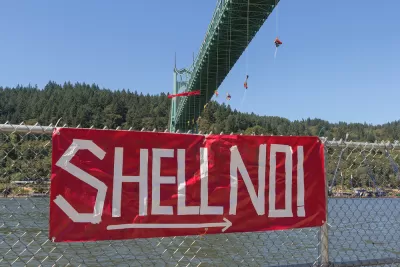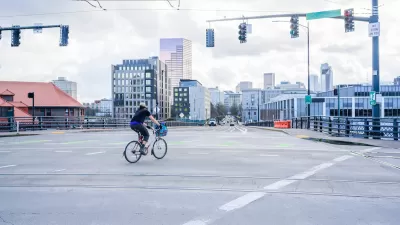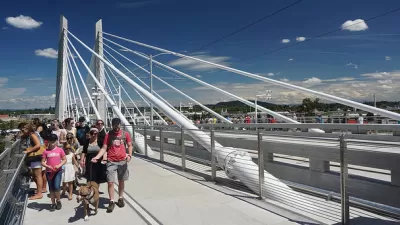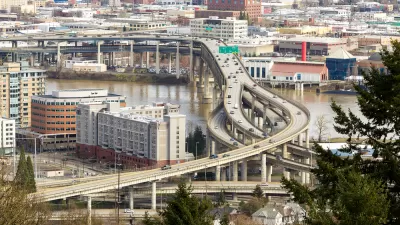Originally approved by 52 percent of voters in May 2016, the 4-year, 10 cents per gallon city gas tax has outperformed revenue projections. Funds are split between road maintenance and bike and pedestrian projects.

"Portland Commissioner Chloe Eudaly said [March 20] that she plans to send a 10-cent gas tax back to voters in May 2020," reported Andrew Theen for The Oregonian. Eudaly, who also oversees the Portland Bureau of Transportation, made the announcement during the City Council’s first annual briefing on the 2016 voter-approved gas tax.
The announcement comes as the city is just hitting the halfway mark on its four-year gas tax, but transportation officials say the funding scheme has already and consistently overperformed the city’s initial revenue projections... Portland has collected $39 million in gas tax money so far, $7 million more than initially estimated.
The majority of the gas tax revenue, 56 percent, goes to street maintenance projects while the remainder is spent on pedestrian or bicycle safety.
Constitutional restrictions prevent revenue from being spent on public transit, emailed Elliot Njus, commuting and transportation reporter for The Oregonian.
The May 17, 2016, Measure 26-173 Motor Vehicles Fuels Tax (also see Ballotpedia: Temporary fuel tax referendum: Resolution 37185) was sponsored by then-Portland Transportation Commissioner Steve Novick, "who was running for re-election to his council seat on the same ballot," reported Njus on May 18, 2016.
"If that passes, I'm going to be ecstatic," Novick said earlier Tuesday night, as his own race appeared headed to a runoff election. "If I had to choose between the gas tax and going to November myself, I would choose the gas tax anytime."
Sadly for Novick, the choice was made for him in the following November election, but no doubt he is pleased that his successor, Eudaly, is continuing his legacy in having city motorists pay for street maintenance and bike and pedestrian safety and infrastructure improvements. Oregon cyclists also directly pay for the latter when they purchase bicycles and pay the nation's first and only state bicycle excise tax, thanks to the passage of HB 2017.
Portland's truck tax
Theen also reports on the Portland Heavy Vehicle Use Tax that applies to companies that pay the Oregon Weight-Mile Tax. It was approved by the City Council on May 11, 2016, to show voters that heavy trucks, which disproportionately contribute to road wear, would also pay toward road upkeep. Despite the "fuel tax" name in the ballot measure, only gasoline is taxed.
Revenues are lower than initially projected after the city council bowed to industry pressure, resulting in fewer vehicles paying the fee, reported Gordon R. Friedman for The Oregonian on Nov. 27, 2018.
Related in Planetizen:
-
Portland's 10-Cent Gas Tax Gets to Work, September 20, 2016Portland isn’t collecting a gas tax approved by voters in May yet, but the city is already finding a way to spend the money.
FULL STORY: Portland will send 10-cent gas tax back to voters in May 2020

Trump Administration Could Effectively End Housing Voucher Program
Federal officials are eyeing major cuts to the Section 8 program that helps millions of low-income households pay rent.

Planetizen Federal Action Tracker
A weekly monitor of how Trump’s orders and actions are impacting planners and planning in America.

Ken Jennings Launches Transit Web Series
The Jeopardy champ wants you to ride public transit.

Rebuilding Smarter: How LA County Is Guiding Fire-Ravaged Communities Toward Resilience
Los Angeles County is leading a coordinated effort to help fire-impacted communities rebuild with resilience by providing recovery resources, promoting fire-wise design, and aligning reconstruction with broader sustainability and climate goals.

When Borders Blur: Regional Collaboration in Action
As regional challenges outgrow city boundaries, “When Borders Blur” explores how cross-jurisdictional collaboration can drive smarter, more resilient urban planning, sharing real-world lessons from thriving partnerships across North America.

Philadelphia Is Expanding its Network of Roundabouts
Roundabouts are widely shown to decrease traffic speed, reduce congestion, and improve efficiency.
Urban Design for Planners 1: Software Tools
This six-course series explores essential urban design concepts using open source software and equips planners with the tools they need to participate fully in the urban design process.
Planning for Universal Design
Learn the tools for implementing Universal Design in planning regulations.
Ada County Highway District
Clanton & Associates, Inc.
Jessamine County Fiscal Court
Institute for Housing and Urban Development Studies (IHS)
City of Grandview
Harvard GSD Executive Education
Toledo-Lucas County Plan Commissions
Salt Lake City
NYU Wagner Graduate School of Public Service





























